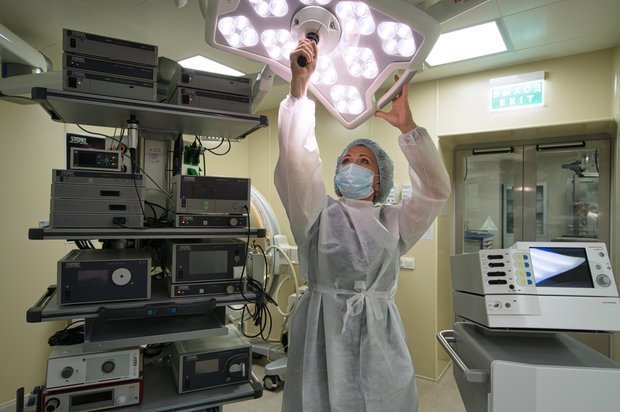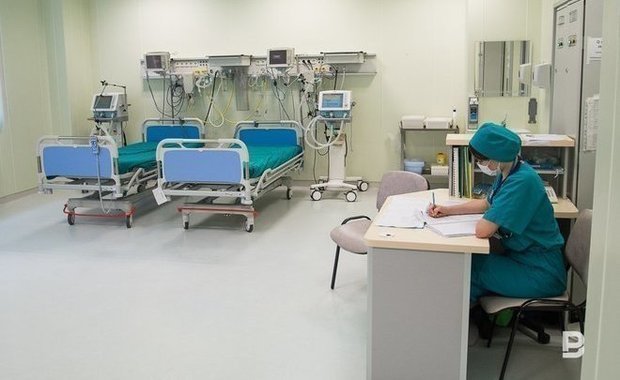Vladimir Kalistratov: ‘Most clinics have switched to new supply routes’
Expert — on the problems of adaptation of private medicine in Tatarstan in the conditions of anti-Russian sanctions
Today, about 100 thousand private medical organisations work in Russia, and about 2 thousand of them are in Tatarstan. According to the participants of this market, the difficulties that the past year brought with it served as an adaptation to work in new economic and geopolitical conditions. The greatest impact of anti-Russian sanctions is felt by diagnostic centres, as well as clinics with a narrow profile or with high-tech medical equipment, which were more dependent on foreign suppliers than others. Vladimir Kalistratov, the director of Yestestvenniy Otbor (translated as Natural Selection — ed.) Republican Association of Private Medical Clinics Union, Chairman of the Committee on Extra-budgetary Medicine and Public Health at the Tatarstan Chamber of Commerce and Industry, Candidate of Medical Sciences, tells about these and other problems of the industry, as well as alternatives to their solutions in the author's column for Realnoe Vremya.
Blow to dentists, ophthalmologists, and laboratory diagnosticians
Despite all the upheavals that took place in the economic and political life of our country, the past year was a kind of “trial period” for the sphere of private medical services. It was a period of adaptation to anti-Russian sanctions and the consequences of the coronavirus pandemic. I think that these two streams of problems have become significant for commercial medicine.
Today in Tatarstan, the non-governmental sector of medicine is almost 2 thousand medical organisations, including departmental ones operating, for example, on the basis of industrial enterprises. Our union provides information support to all applicants, including those related to the issues of accreditation of medical activities, inspections, quality and safety of medical care, discussions of the most pressing issues of both private and public medical services, insurance of professional liability of medical workers. As experts, our participants are involved in the discussion and evaluation of upcoming and ready-made laws and legislative initiatives.
Speaking about the problems associated with the introduction of global restrictions on Russia, it should be noted, first of all, their systemic nature. First of all, the sanctions have had an impact on medical organisations of a narrow profile: dentistry, ophthalmology, laboratory diagnostics, rehabilitation, and high-tech clinics.
These organisations are more saturated than others with medical equipment and consumables of foreign production. The equipment, no matter how high-quality and modern it is, requires regular and timely updating, after-sale service. With this, difficulties began to arise after the introduction of mass sanctions, and they concern those private medical organisations where the share of the imported component was quite high.
The second component of the problems is consumables. There was a violation of traditional logistics chains, and those stocks of materials that were still available gradually began to become scarce. Nevertheless, adaptation has come and most clinics have switched to new supply routes, someone has not yet exhausted their existing stock of funds.
The third component is the repair of imported medical equipment. The resource of its use is not infinite, and even high-quality foreign equipment can break down, fail. And this increases the risks and, above all, can affect the quality and safety of medical care. We can't ignore it.
“The severity of the problems has almost been removed”
At first, many clinics, where imported equipment is intensively used, thought that the situation would deteriorate dramatically. But the results of the survey among organisations say otherwise. Almost everyone has adapted, and the severity of the problems has almost been removed. New logistics chains have been formed or are being formed, which allow replenishing supplies and maintaining equipment at a workable level. Certainly, this does not mean that there are no problems. Problems and their solution are a constant part of our work, it is a constant uphill climb.

Last spring, not only medical businesses faced issues of adaptation to new conditions, but also the authorities themselves — in terms of state support provided to this healthcare industry. The Chamber of Commerce and Industry of Tatarstan provided significant assistance to SMEs, including our union.
We cannot talk about what losses private medicine suffered in general last year — there are no such statistics, and the question is whether this assessment will be correct if it is consolidated with respect to losses. Firstly, the volume and scale of medical organisations' activities are very different from each other. For example, for a large multidisciplinary clinic, the decrease in income for 2022 may be only 3-5%, and for small organisations and private offices this indicator may be more significant. There are losses, but the opportunity to make up for them is great — in this, we rely again on the results of the survey.
Let's talk about reputation. Highly specialised clinics are in a more vulnerable position to public opinion. Any unfounded complaint on the part of the patient, moreover, replicated in the media or social networks, can seriously discredit the activities of this organisation, cause irreparable damage to its reputation, which will be very difficult to restore.
Cost of services has gone up
How have all these points affected pricing? Certainly, to some extent, the cost of private medicine services has gone up. But this could not but happen, since the costs of the clinics themselves also increased. In addition, the period of adaptation to work in new conditions is still underway, and those channels that have already been established require stabilisation and monitoring. It should take some time to evaluate one or another source of supplies.
Nevertheless, in my opinion, cooperation with businesses has begun to be established. In terms of state support for business, this is evident from the activities of both the republican authorities and the federal government — the situation here began to change rapidly for the better.

As for demand, the flow of patients in non-state clinics began to fall sharply in the spring of 2020, when the coronavirus infection swept the world. However, after a while, attendance gradually recovered. And it is incorrect to say today that the clients of private clinics began to leave en masse in the direction of free medicine.
Some medical centres left the republic's market last year, but it is difficult to track the exact number of closed clinics. Here it happens that the organisation is no longer active, but this information is not updated in official sources. Or another example, when a business owner decides to reorient the work of his organisation, the former clinic closes in this case, another one appears, but in a different format.
By the end of this year, I think the Tatarstan private medicine market will have still adapted to the new working conditions. Losses will be less than gains, in turn, the interaction of the private and public sectors, I think, will rise a step higher and thereby improve. All this together should lead to that in the coming years, the potential of public healthcare will, albeit slowly, but grow.
At the same time, one should beware of impulsive decisions — they should be balanced and thoughtful (especially with regard to any bans or fines). Today we must clearly understand: what surrounds us, what we can do, and what solutions are available to us. Just hoping is also not enough, it is necessary to make efforts. Our success should be the result of our efforts, not the goal.
Reference
The author's opinion may not coincide with the position of the editorial board of Realnoe Vremya.